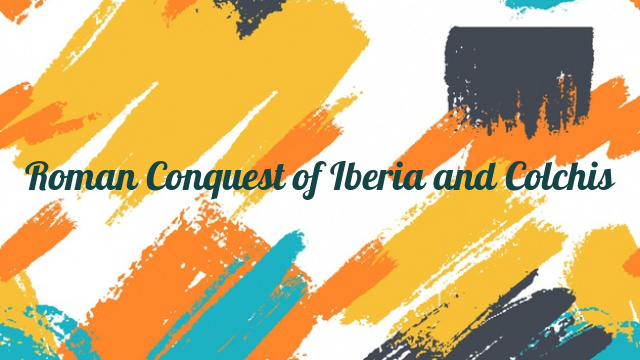
Roman Conquest of Iberia and Colchis
This close association with Armenia brought upon the country an invasion (65 BC) by the Roman general Pompey, who was then at war with Mithradates VI of Pontus, and Armenia; but Rome did not establish her power permanently over Iberia. Nineteen years later, the Romans again marched (36 BC) on Iberia forcing King Pharnavaz II to join their campaign against Albania.
During this time Armenia and Pontus were actively expanding at the expense of Rome, taking over its Eastern Mediterranean possessions. However, the success of the anti-Roman alliance did not last long. As a result of the brilliant Roman campaigns of Pompey and Lucullus from the west, and the Parthian invasion from the south, Armenia lost a significant part of its conquests by 65 BC, devolving into a Roman-Parthian dependency. At the same time, the Kingdom of Pontus was completely destroyed by the Romans and all its territory including Colchis were incorporated into the Roman Empire as her provinces. The former Kingdom of Colchis was reorganized by the Romans into the province of Lazicum ruled by Roman legati. The following 600 years of Georgian history were marked by struggle between Rome and Persia(Iran) including Parthians and Sassanids who were fighting long wars against each other for the domination in the Middle East including Syria, Mesopotamia, Armenia, Albania, and Iberia. In the 2nd century AD, Iberia strengthened her position in the area, especially during the reign of King Pharsman II who achieved full independence from Rome and reconquered some of the previously lost territories from declining Armenia. In the early 3rd century, Rome had to give up Albania and most of Armenia to Sassanid Iran. The province of Lazicum was given a degree of autonomy that by the end of the century developed into full independence with the formation of a new Kingdom of Lazica-Egrisi on the territories of smaller principalities of the Zans, Svans, Apsyls, and Sanyghs. This new Western Georgian state survived more than 250 years until in 562 when it was absorbed by the Byzantine Empire.




